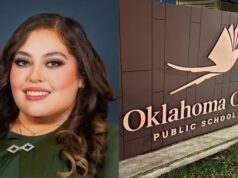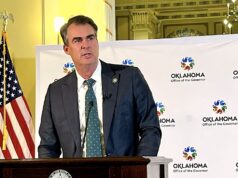
On Election Night, our team at NonDoc is typically focused on reporting the basic results of the most prominent races we have been previewing and following. But other interesting nuggets and trends can typically be found buried within the Oklahoma State Election Board’s results page.
From a slate of school bonds to an unusual mayoral ousting in an Oklahoma County community, here are five details you may have missed about Oklahoma’s Feb. 9 election.
Voter turnout down in some races compared to 2017
With winter precipitation creating road problems across parts of the state and bone-chilling cold a fact of life in every corner of it, voter turnout fell below expectations in a few Oklahoma County elections relative to 2017 contests.
In the race for board chairperson of Oklahoma City Public Schools, a combined 4,664 people voted in the election, which left first-place finisher Charles Henry and incumbent Paula Lewis advancing to the runoff because neither received more than 50 percent of the vote. For the same race in 2017, 7,833 people voted, with Lewis also finishing second. She won the April 2017 runoff in which more than 11,000 people voted.
Also in 2017, the Ward 4 OKC City Council seat featured an open race between Todd Stone, Richard Morrissette and others that ultimately went to a runoff. In that election, 1,782 voters cast ballots in the primary. Four years later, as Stone cruised to re-election Tuesday, only 1,247 people voted.
Because there was no incumbent running in Ward 1 this year, the west OKC race featured nine candidates and actually went against the city’s trend of decreased turnout. With nine people working to drag their closest friends, neighbors and family members to the polls, 3,383 voters cast ballots. In the same race in 2017 with incumbent James Greiner facing two challengers, only 2,056 people cast votes.
Bethany mayor booted by big margin
In Bethany, the mayoral election also bucked the turnout trend, with motivated residents not letting nasty weather stop them from seeking change.
Voters emphatically ousted incumbent Mayor KP Westmoreland in favor of the city’s former public relations specialist who alleged in a civil lawsuit that she “was fired in significant part because of her bringing to light corruption in the city to the attention of state law enforcement and prosecutorial agencies.”

Communications professional Nikki Phipps received nearly 74 percent of Tuesday’s vote, a trouncing that underscores frustration in Bethany about the city’s multi-million-dollar budget problems. (Voter turnout jumped from 1,471 people in 2017 to 1,596 this year.)
In September, Westmoreland was painted in an unfavorable light by a city investigation that he called incomplete because it did not include an interview with him. Months earlier, the Bethany City Council had voted unanimously to investigate the Westmoreland, who had been criticized by the community’s former city manager in a resignation letter. Bethany has had nine city managers over the past decade.
Phipps’ employment by the City of Bethany was terminated in 2018 by one of those city managers, and her lawsuit over the matter was settled in August. Now she will become the community’s mayor.
Endorsement sought in Norman Ward 3 runoff
In the aftermath of the Norman City Council elections, the two Ward 3 candidates headed to a runoff are each seeking the endorsement of the third candidate, Sam Talley.
Incumbent Councilwoman Alison Petrone was taken to a runoff by Kelly Lynn, who was endorsed by Unite Norman, a group that attempted to recall Petrone from her seat. Wednesday, both Lynn and Petrone posted flattering Facebook messages about Talley in pursuit of his endorsement, even though Lynn had distributed a mailer criticizing Talley in the days before the Feb. 9 election.
Meanwhile in Norman Ward 5, Rarchar S. Tortorello defeated the incumbent councilman Michael Nash, who was appointed to the seat after Sereta Wilson resigned while Unite Norman was collecting signatures for her recall.
According to The Norman Transcript, Tortorello attended then-President Donald Trump’s Jan. 6 rally in Washington and has posted QAnon conspiracy content on social media. He was endorsed by Unite Norman as well as the Norman Fraternal Order of Police. But Tortorello’s most prominent endorsements were from country singer and songwriter Toby Keith and former University of Oklahoma football coaches Bob Stoops and Barry Switzer, according to a mailer on Facebook. Still, that trio’s other endorsements — including Talley — were not as successful.
Across town, Ward 7 Councilman Stephen Tyler Holman earned his fifth term on the council defeating two other candidates, one of whom was endorsed by Unite Norman. Only 771 people voted in the race, by far the fewest of the Norman council elections.
14 of 16 Oklahoma school bonds pass
A slew of school bond issues passed during Oklahoma’s Feb. 9 election. Oklahoma law requires school bond issues to receive at least 60 percent of the vote in order for a school district to issue a bond, which functionally raises property taxes. Fourteen of the 16 districts voting on bond issuances approved their proposals: Allen, Caney Valley, Chickasha, Crutcho, Depew, Grove, Haileyville, Howe, Jenks, Leach, McAlester, Nowata, Ringling, Weleetka and Wilson public schools.
Quinton Public Schools failed to pass its proposal — a $6.4 million effort for school improvements. The bond received only 55.1 percent of the vote owing to its 65-53 margin. Quinton Public Schools has 387 students enrolled this year. Leach Public School’s, a district with about 141 students enrolled, failed to pass its bond issue as well. About 65 percent of ballots were cast against the $1.72 million bond proposal that would have gone towards improving school sites.
Meanwhile, voters in Waukomis — a small community in Garfield County — approved a bond issue for Waukomis Public Schools with 60.19 percent of the vote. Put another way, had two of the 189 voters in favor of the proposal stayed home, the bond measure would have failed.
The $7.38 million bond is the largest the district has ever passed. About 90 percent of the funds are earmarked for the construction of a new elementary school and cafeteria building. The rest of the bond money will go toward safety equipment funding, bleacher replacement, redoing parking lots and the band department.
Voters in Jenks have passed 57 of the last 58 proposed bond issues, and Tuesday’s election was no exception. Two separate bond issues totaling $16.1 million passed with nearly 78 percent of the vote. The money will go toward an array of district improvements including safety upgrades, updates to the performing arts center and expansion at the district’s “freshman academy.”
Voters also approved two bond issues for Chickasha Public Schools. The combined $2.7 million bond issues each passed with about 69 percent of the vote and will go toward district improvements and repairs for school buildings and facilities.
Located at Northeast 23rd Street and Air Depot Boulevard in Oklahoma City, the Crutcho Public Schools district operates a single school with 298 students, according to Oklahoma State Department of Education data. Tuesday, voters in the district approved a $920,000 bond for school improvements by a 15-1 vote.
Grove Public Schools passed its bond proposal with about 79 percent of the vote. The $8.1 million bond will go towards the construction of a new early childhood center as well as other projects.
Lawton voters continue motel tax for slate of projects
Only 1,617 Lawton voters went to the polls Feb. 9, but an overwhelming majority of them (76.7 percent) said yes to an extension of the city’s hotel-motel tax. The 10-year extension of the 7 percent tax does not apply to Lawton residents who can prove their residency while staying in a lodging establishment.
The Lawton Constitution described the tax’s impact:
By definition, the tax is restricted to expenditures that encourage, promote and foster conventions, tourism, industrial development and economic development. The revenue supports activities as diverse as economic development, funding the fireworks display that closes out the annual Freedom Festival, and aiding groups such as Lawton Philharmonic Orchestra and Lawton Heritage Association (which operates the Mattie Beal Home).
In an average year, the 5.5 percent tax generates about $1.2 million annually. City officials estimate the 1.5 percent increase in the tax will generate another $300,000.
(Correction: This article was corrected at 4:10 p.m. on Thursday, Feb. 11, to state that 14 of 16 Oklahoma school bond issues had passed and to include information about Grove and Leach Schools. It was updated at 11:45 a.m. Thursday, Feb. 11, to include reference and a link to a Norman Transcript article.)





















